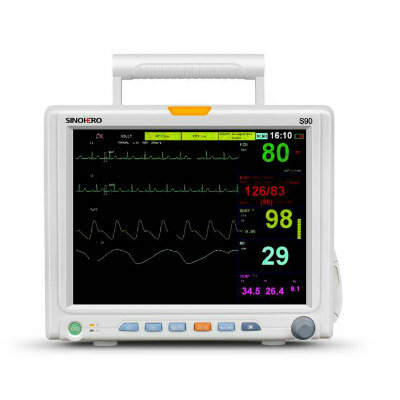First Stem Cell Clinical Trial for Protection Against COVID-19 Approved by FDA
|
By HospiMedica International staff writers Posted on 09 Apr 2020 |

Illustration
The FDA has approved a Phase II clinical trial evaluating efficacy and safety of Hope Biosciences’ (Sugar Land, TX, USA) autologous, adipose-derived mesenchymal stem cells (HB-adMSCs) to provide immune support against COVID-19. MSCs are well-known for their immunomodulatory and regenerative potential. In a recent Phase I/II clinical trial for rheumatoid arthritis, results appeared to show that HB-adMSCs were safe and effective in attenuating systemic inflammation. In COVID-19 patients, inflammation is a driving force behind disease progression, and it is critical to regulate the immune system as early as possible.
This Phase II study is a single arm, non-randomized study that is expected to enroll 75 participants that are either 50 years of age, have preexisting health conditions, or are at high-exposure risk. The study’s primary objective is to determine the efficacy of HB-adMSCs to prepare the immune system so that it is better able to fight the virus, should one become infected. Hope anticipates that this pretreatment will limit the progression and severity of COVID-19, ultimately keeping patients out of the hospital and off of mechanical ventilation. HB-adMSCs are administered via five intravenous infusions over a fourteen-week period and follow-up evaluations through six months. All participants will be monitored for changes in health status, including immune cell levels, inflammatory markers, and requirements for supplemental care or hospitalization.
This is the first of three New Drug Applications (INDs), related to COVID-19, that Hope has filed with FDA. This initial protocol is specifically designed for patients who already have their own stem cells banked with the company. The next two protocols will utilize a donor cell source that will aim in protecting against COVID-19 for those at high risk (patients and frontline workers) and treating hospitalized patients.
“This study will utilize our proprietary core technology to deliver high quality, pure mesenchymal stem cells with standardized doses and multiple treatments. Our novel technology allows us to overcome the burdens of traditional cell therapy, such as inability to make enough cells to make a significant impact. We can produce, on-demand, over 1,000 highly concentrated HB-adMSC treatments from a single tablespoon of the patient’s own fat tissue. Most people who have been severely affected by COVID-19 had preexisting conditions. We are pretreating participants who are at higher risk of developing severe COVID-19, with the belief that we can prepare their immune systems, giving them their best chance to fight the virus” said Donna Chang, President and CEO of Hope Biosciences.
“Our ultimate goal is to prevent anyone from needing mechanical ventilation. We believe that interceding early in the inflammatory process will give us the best possible outcome. Treating the disease is very important but if we have a chance to prevent the condition, we must explore all options. We appreciate the FDA’s willingness to take this groundbreaking approach at such a critical time for our nation” added Chang.
Related Links:
Hope Biosciences
This Phase II study is a single arm, non-randomized study that is expected to enroll 75 participants that are either 50 years of age, have preexisting health conditions, or are at high-exposure risk. The study’s primary objective is to determine the efficacy of HB-adMSCs to prepare the immune system so that it is better able to fight the virus, should one become infected. Hope anticipates that this pretreatment will limit the progression and severity of COVID-19, ultimately keeping patients out of the hospital and off of mechanical ventilation. HB-adMSCs are administered via five intravenous infusions over a fourteen-week period and follow-up evaluations through six months. All participants will be monitored for changes in health status, including immune cell levels, inflammatory markers, and requirements for supplemental care or hospitalization.
This is the first of three New Drug Applications (INDs), related to COVID-19, that Hope has filed with FDA. This initial protocol is specifically designed for patients who already have their own stem cells banked with the company. The next two protocols will utilize a donor cell source that will aim in protecting against COVID-19 for those at high risk (patients and frontline workers) and treating hospitalized patients.
“This study will utilize our proprietary core technology to deliver high quality, pure mesenchymal stem cells with standardized doses and multiple treatments. Our novel technology allows us to overcome the burdens of traditional cell therapy, such as inability to make enough cells to make a significant impact. We can produce, on-demand, over 1,000 highly concentrated HB-adMSC treatments from a single tablespoon of the patient’s own fat tissue. Most people who have been severely affected by COVID-19 had preexisting conditions. We are pretreating participants who are at higher risk of developing severe COVID-19, with the belief that we can prepare their immune systems, giving them their best chance to fight the virus” said Donna Chang, President and CEO of Hope Biosciences.
“Our ultimate goal is to prevent anyone from needing mechanical ventilation. We believe that interceding early in the inflammatory process will give us the best possible outcome. Treating the disease is very important but if we have a chance to prevent the condition, we must explore all options. We appreciate the FDA’s willingness to take this groundbreaking approach at such a critical time for our nation” added Chang.
Related Links:
Hope Biosciences
Latest COVID-19 News
- Low-Cost System Detects SARS-CoV-2 Virus in Hospital Air Using High-Tech Bubbles
- World's First Inhalable COVID-19 Vaccine Approved in China
- COVID-19 Vaccine Patch Fights SARS-CoV-2 Variants Better than Needles
- Blood Viscosity Testing Can Predict Risk of Death in Hospitalized COVID-19 Patients
- ‘Covid Computer’ Uses AI to Detect COVID-19 from Chest CT Scans
- MRI Lung-Imaging Technique Shows Cause of Long-COVID Symptoms
- Chest CT Scans of COVID-19 Patients Could Help Distinguish Between SARS-CoV-2 Variants
- Specialized MRI Detects Lung Abnormalities in Non-Hospitalized Long COVID Patients
- AI Algorithm Identifies Hospitalized Patients at Highest Risk of Dying From COVID-19
- Sweat Sensor Detects Key Biomarkers That Provide Early Warning of COVID-19 and Flu
- Study Assesses Impact of COVID-19 on Ventilation/Perfusion Scintigraphy
- CT Imaging Study Finds Vaccination Reduces Risk of COVID-19 Associated Pulmonary Embolism
- Third Day in Hospital a ‘Tipping Point’ in Severity of COVID-19 Pneumonia
- Longer Interval Between COVID-19 Vaccines Generates Up to Nine Times as Many Antibodies
- AI Model for Monitoring COVID-19 Predicts Mortality Within First 30 Days of Admission
- AI Predicts COVID Prognosis at Near-Expert Level Based Off CT Scans
Channels
Critical Care
view channel
Ingestible Smart Capsule for Chemical Sensing in the Gut Moves Closer to Market
Intestinal gases are associated with several health conditions, including colon cancer, irritable bowel syndrome, and inflammatory bowel disease, and they have the potential to serve as crucial biomarkers... Read moreNovel Cannula Delivery System Enables Targeted Delivery of Imaging Agents and Drugs
Multiphoton microscopy has become an invaluable tool in neuroscience, allowing researchers to observe brain activity in real time with high-resolution imaging. A crucial aspect of many multiphoton microscopy... Read more
Novel Intrabronchial Method Delivers Cell Therapies in Critically Ill Patients on External Lung Support
Until now, administering cell therapies to patients on extracorporeal membrane oxygenation (ECMO)—a life-support system typically used for severe lung failure—has been nearly impossible.... Read moreSurgical Techniques
view channel
Pioneering Sutureless Coronary Bypass Technology to Eliminate Open-Chest Procedures
In patients with coronary artery disease, certain blood vessels may be narrowed or blocked, requiring a stent or a bypass (also known as diversion) to restore blood flow to the heart. Bypass surgeries... Read more
Intravascular Imaging for Guiding Stent Implantation Ensures Safer Stenting Procedures
Patients diagnosed with coronary artery disease, which is caused by plaque accumulation within the arteries leading to chest pain, shortness of breath, and potential heart attacks, frequently undergo percutaneous... Read more
World's First AI Surgical Guidance Platform Allows Surgeons to Measure Success in Real-Time
Surgeons have always faced challenges in measuring their progress toward surgical goals during procedures. Traditionally, obtaining measurements required stepping out of the sterile environment to perform... Read morePatient Care
view channel
Portable Biosensor Platform to Reduce Hospital-Acquired Infections
Approximately 4 million patients in the European Union acquire healthcare-associated infections (HAIs) or nosocomial infections each year, with around 37,000 deaths directly resulting from these infections,... Read moreFirst-Of-Its-Kind Portable Germicidal Light Technology Disinfects High-Touch Clinical Surfaces in Seconds
Reducing healthcare-acquired infections (HAIs) remains a pressing issue within global healthcare systems. In the United States alone, 1.7 million patients contract HAIs annually, leading to approximately... Read more
Surgical Capacity Optimization Solution Helps Hospitals Boost OR Utilization
An innovative solution has the capability to transform surgical capacity utilization by targeting the root cause of surgical block time inefficiencies. Fujitsu Limited’s (Tokyo, Japan) Surgical Capacity... Read more
Game-Changing Innovation in Surgical Instrument Sterilization Significantly Improves OR Throughput
A groundbreaking innovation enables hospitals to significantly improve instrument processing time and throughput in operating rooms (ORs) and sterile processing departments. Turbett Surgical, Inc.... Read moreHealth IT
view channel
Printable Molecule-Selective Nanoparticles Enable Mass Production of Wearable Biosensors
The future of medicine is likely to focus on the personalization of healthcare—understanding exactly what an individual requires and delivering the appropriate combination of nutrients, metabolites, and... Read more
Smartwatches Could Detect Congestive Heart Failure
Diagnosing congestive heart failure (CHF) typically requires expensive and time-consuming imaging techniques like echocardiography, also known as cardiac ultrasound. Previously, detecting CHF by analyzing... Read moreBusiness
view channel
Expanded Collaboration to Transform OR Technology Through AI and Automation
The expansion of an existing collaboration between three leading companies aims to develop artificial intelligence (AI)-driven solutions for smart operating rooms with sophisticated monitoring and automation.... Read more


















